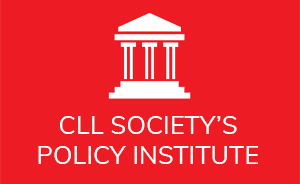Home » Needs of the Immunocompromised – CLL Society’s Policy Institute

Needs of the Immunocompromised
COVID-19 not only shed light on the need for policy engagement on behalf of our community, it also represented some early victories for CLL Society. We successfully initiated grassroot letter writing campaigns early on in the pandemic when blood cancer patients were not prioritized to receive COVID-19 vaccinations unless they were actively receiving cancer therapy, and we worked tirelessly with the National Institute of Health (NIH) to change the definition of who is considered immunocompromised to include those diagnosed with CLL / SLL regardless of treatment status.
CLL Society has realized that our future policy work addressing the needs of the immunocompromised will not be limited o the challenges faced due to COVID-19. As the world moves on to the endemic phase, we will be raising the bar from a reactive approach to a systematic, thoughtful, and proactive approach in our continued work with government agencies. This will lend credibility to CLL Society’s Policy Institute work and make us more effective in achieving our goals.
The following are some examples of the efforts that fall under the Policy Institute's ‘Needs of the Immunocompromised’ pillar:
FDA’s EUA-type of Approvals That Will Take Place Outside of the Public Health Emergency Declaration.
We must continue to look ahead to ensure there is continued governmental urgency surrounding the development of COVID-19 monoclonal antibodies and other therapeutics to keep up with the rapidly evolving virus mutations which will continue to occur. There will also need to be continued regulatory mechanisms in place for authorization that prioritizes the critical need for these therapeutics for our at-risk immunocompromised community. Without a continuing EAU-type of approval mechanism, regulatory action will not be able to keep up-to-pace with rapidly evolving science, and our patients will remain at high-risk for fatal COVID-19 outcomes even as the rest of the nation seemingly returns to “normal”.
Continued Access to Care in Settings that Keep Immunocompromised Patients Safe.
Throughout the COVID-19 pandemic, patients have had increased access to care within the safety of their homes through expanded services offered as a result of the pandemic, such as the expanded coverage of telehealth office visits with healthcare providers. These flexibilities in the delivery of care model will likely remain important for many within our patient community. As the Public Health Emergency draws to a close, policy makers will be making decisions on whether to continue the flexibilities in delivery of care that were implemented in response to the COVID-19 pandemic. CLL Society’s Policy Institute aims to keep these expanded services in place as an option for those who choose to do so.
OUR IMMUNOCOMPROMISED-RELATED POLICY WORK:
RECENT NEWS
Home » Needs of the Immunocompromised – CLL Society’s Policy Institute

Needs of the Immunocompromised
COVID-19 not only shed light on the need for policy engagement on behalf of our community, but it also gave CLL Society an early taste of success. We successfully initiated grassroot letter writing campaigns early on in the pandemic when blood cancer patients were not prioritized to receive COVID-19 vaccinations unless they were actively receiving cancer therapy, and we worked tirelessly with the National Institute of Health (NIH) to change the definition of who is considered immunocompromised to include those diagnosed with CLL / SLL regardless of treatment status.
CLL Society has realized that our future policy work addressing the needs of the immunocompromised will not be limited o the challenges faced due to COVID-19. As the world moves on to the endemic phase, we will be raising the bar from a reactive approach to a systematic, thoughtful, and proactive approach in our continued work with government agencies. This will lend credibility to CLL Society’s Policy Institute work and make us more effective in achieving our goals.
The following are some examples of the efforts that fall under the Policy Institute's ‘Needs of the Immunocompromised’ pillar:
FDA’s EUA-type of Approvals That Will Take Place Outside of the Public Health Emergency Declaration.
We must continue to look ahead to ensure there is continued governmental urgency surrounding the development of COVID-19 monoclonal antibodies and other therapeutics to keep up with the rapidly evolving virus mutations which will continue to occur. There will also need to be continued regulatory mechanisms in place for authorization that prioritizes the critical need for these therapeutics for our at-risk immunocompromised community. Without a continuing EAU-type of approval mechanism, regulatory action will not be able to keep up-to-pace with rapidly evolving science, and our patients will remain at high-risk for fatal COVID-19 outcomes even as the rest of the nation seemingly returns to “normal”.
Continued Access to Care in Settings that Keep Immunocompromised Patients Safe.
Throughout the COVID-19 pandemic, patients have had increased access to care within the safety of their homes through expanded services offered as a result of the pandemic, such as the expanded coverage of telehealth office visits with healthcare providers. These flexibilities in the delivery of care model will likely remain important for many within our patient community. As the Public Health Emergency draws to a close, policy makers will be making decisions on whether to continue the flexibilities in delivery of care that were implemented in response to the COVID-19 pandemic. CLL Society’s Policy Institute aims to keep these expanded services in place as an option for those who choose to do so.



